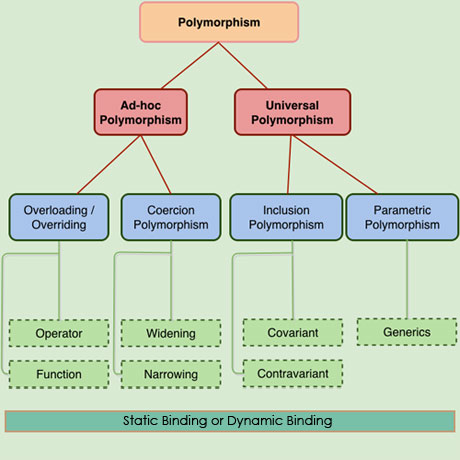Java Polymorphism
来源:互联网 发布:英语入门软件 编辑:程序博客网 时间:2024/05/21 09:20
Java Polymorphism
Ability of an organism to take different shapes is polymorphism in bio world.
A simplest definition in computer terms would be, handling different data types using the same interface.
In this tutorial, we will learn about what is polymorphism in computer science and how polymorphism can be used in Java.
I wish this tutorial will help address the following,
- is overloading polymorphism?
- is overriding polymorphism?
- Ad hoc Polymorphism
- Parametric Polymorphism
- Coercion Polymorphism
- Inclusion or subtype Polymorphism
- what is static-binding?
- what is dynamic binding?
Types of Polymorphism
Polymorphism in computer science was introduced in 1967 by Christopher Strachey.
Please let me know with reference if it is not a fact and the tutorial can be updated.
Following are the two major types of polymorphism as defined by Strachey.
- Ad hoc Polymorphism
- Parametric Polymorphism
Later these were further categorized as below:

Ad hoc Polymorphism
"Ad-hoc polymorphism is obtained when a function works, or appears to work, on several different types (which may not exhibit a common structure) and may behave in unrelated ways for each type.
Parametric polymorphism is obtained when a function works uniformly on a range of types; these types normally exhibit some common structure." – Strachey 1967
If we want to say the above paragraph in two words, they are operator overloading and function overloading.
Determining the operation of a function based on the arguments passed.
Ad hoc Polymorphism in Java
In Java we have function overloading and we do not have operator overloading. Yes we have “+” operator implemented in a polymorphic way.
String fruits = "Apple" + "Orange";int a = b + c;
The definition is when the type is different, the internal function adjusts itself accordingly.
int and float are different types and so even the following can be included in polymorphism operator overloading.
int i = 10 - 3;float f = 10.5 - 3.5;
Similarly even * and / can be considered as overloaded for int and float types.
Having said all the above, these are all language implemented features.
Developers cannot custom overload an operator. So answer for the question, “does Java supports operator overloading?” is “yes and no”.
Java wholeheartedly supports function overloading. We can have same function name with different argument type list.
For function overloading in Java I have already written a super-hit tutorial and I am sure you will enjoy reading it.
In inheritance, the ability to replace an inherited method in the subclass by providing a different implementation is overriding.
Function overriding in is discussed in the same tutorial as overloading.
Polymorphism is a larger concept which consists of all these different types.
So it is not right to say that overloading or overriding alone is polymorphism. It is more than that.
Coercion Polymorphism
Implicit type conversion is called coercion polymorphism.
Assume that we have a function with argument int.
If we call that function by passing a float value and if the run-time is able to convert the type and use it accordingly then it is coercion polymorphism.
Now with this definition, let us see if Java has coercion polymorphism.
The answer is half yes. Java supports widening type conversion and not narrowing conversions.
Narrowing Conversion
class FToC { public static float fToC (int fahrenheit) { return (fahrenheit - 32)*5/9; } public static void main(String args[]) { System.out.println(fToC(98.4)); }}
Java does not support narrowing conversion and we will get error as "FToC.java:7: fToC(int) in FToC cannot be applied to (double)"
Widening Conversion
class FToC { public static float fToC (float fahrenheit) { return (fahrenheit - 32)*5/9; } public static void main(String args[]) { System.out.println(fToC(98)); }}
The above code will work without an error in Java. We are passing an int value ’98’ wherein the expected value type is a float.
Java implicitly converts int value to float and it supports widening conversion.
Universal Polymorphism
Universal polymorphism is the ability to handle types universally.
There will be a common template structure available for operations definition irrespective of the types.
Universal polymorphism is categorized into inclusion polymorphism and parametric polymorphism.
Inclusion polymorphism (subtype polymorphism)
Substitutability was introduced by eminent Barbara Liskov and Jeannette Wing. It is also called as Liskov substitution principle.
“Let T be a super type and S be its subtype (parent and child class). Then, instances (objects) of T can be substituted with instances of S.”
Replacing the supertype’s instance with a subtype’s instance.
This is called inclusion polymorphism or subtype polymorphism. This is covariant type and the reverse of it is contravariant.
We have discussed the substitution principle and covariant types, contravariant and invariant earlier in the linked tutorial.
This is demonstrated with a code example. Java supports subtype polymorphism from Java / JDK version 1.5.
Parametric Polymorphism
Here we go, we have come to ‘Generics’. This is a nice topic and requires a full detailed tutorial with respect to Java.
For now, parametric polymorphism is the ability to define functions and types in a generic way so that it works based on the parameter passed at runtime. All this is done without compromising type-safety.
The following source code demonstrates a generics feature of Java. It gives the ability to define a class and parameterize the type involved.
The behavior of the class is based on the parameter type passed when it is instantiated.
package com.javapapers.java;import java.util.ArrayList;import java.util.List;public class PapersJar {private List itemList = new ArrayList();public void add(T item) {itemList.add(item);}public T get(int index) {return itemList.get(index);}public static void main(String args[]) {PapersJar papersStr = new PapersJar();papersStr.add("Lion");String str = papersStr.get(0);System.out.println(str);PapersJar papersInt = new PapersJar();papersInt.add(new Integer(100));Integer integerObj = papersInt.get(0);System.out.println(integerObj);}}
Static Binding vs Dynamic Binding
Give all the above polymorphism types, we can classify these under different two broad groups static binding and dynamic binding.
It is based on when the binding is done with the corresponding values.
If the references are resolved at compile time, then it is static binding and if the references are resolved at runtime then it is dynamic binding. Static binding and dynamic binding also called as early binding and late binding.
Sometimes they are also referred as static polymorphism and dynamic polymorphism.
Let us take overloading and overriding for example to understand static and dynamic binding.
In the below code, first call is dynamic binding. Whether to call the obey method of DomesticAnimal or Animal is resolve at runtime and so it is dynamic binding. In the second call, whether the method obey() or obey(String i) should be called is decided at compile time and so this is static binding.
package com.javapapers.java;public class Binding {public static void main(String args[]) {Animal animal = new DomesticAnimal();System.out.println(animal.obey());DomesticAnimal domesticAnimal = new DomesticAnimal();System.out.println(domesticAnimal.obey("Ok!"));}}class Animal {public String obey() {return "No!";}}class DomesticAnimal extends Animal {public String obey() {return "Yes!";}public String obey(String i) {return i;}}
Output:
Yes!
Ok!
Advantages of Polymorphism
- Generics: Enables generic programming.
- Extensibility: Extending an already existing system is made simple.
- De-clutters the object interface and simplifies the class blueprint.
- Java Polymorphism
- Java-polymorphism-01
- Java-polymorphism-02
- Java - Constructors and Polymorphism
- 【Java】多态性Polymorphism
- Java 基础 polymorphism(多态)
- Thinking in java : polymorphism
- java info polymorphism
- Java implement polymorphism
- Polymorphism
- Polymorphism
- polymorphism
- Polymorphism
- Polymorphism
- Polymorphism
- Polymorphism
- Polymorphism
- Polymorphism
- jpa学习-table-per-class
- stm32 固件库之:中断
- wait_event_interruptible() 和 wake_up()的使用
- 2.1.1导论
- 代码整洁之道读书笔记(三)
- Java Polymorphism
- 数据库连接总结
- 机器学习项目开发经验
- NOIP2016 普及组 解题报告
- gdb
- Service 绑定
- java集合系列之LinkList
- 线性时间的排序 - Decision Tree Model & Counting Sort & Radix Sort & Bucket Sort
- vs2015社区版---localESPCui for zh-cn Dev12 问题


